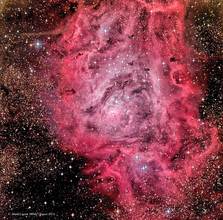The privilege of suggesting a name for a minor planet is accorded to the discoverer. An international committee of astronomers – members of a working group of the International Astronomical Union – have the final authority to officially assign a name to a minor planet. The discoverer has this exclusive privilege for ten years following an object being numbered, after which the committee members themselves may elect to assign a name. They occasionally invite select people to submit names for minor planets for which the ten year exclusivity period has expired. Names are subject to certain rules laid down by the committee.
The Minor Planet Center, which operates at the Smithsonian Astrophysical Observatory, is an organization tasked with being the repository of all observations of minor planets and comets, and computing orbits for them. MPC is responsible for the identification, designation and orbit computation for all of these objects. Recently staff member Michael Rudenko was invited to suggest a name for minor planet (4538), discovered back in 1988 and still unnamed. Rudenko, who received an SB in Mathematics from MIT in 1977, has worked at the MPC since 2009 as an IT Specialist engaged in modernizing the MPC observation processing, orbit computation and related operations. During the 1980s he undertook a visual comet hunting project and discovered three comets with the aid of a six-inch refractor.
"My two passions in life are astronomy and chess," says Mike, who has a Playchess account. "I thought it might be appropriate to name a minor planet in honor of a chess grandmaster. My thoughts at once turned to Viswanathan Anand who, in addition to being the fifteenth world chess champion, is also an astronomy buff."
See the article.


 RSS Feed
RSS Feed